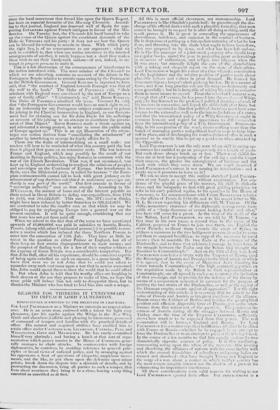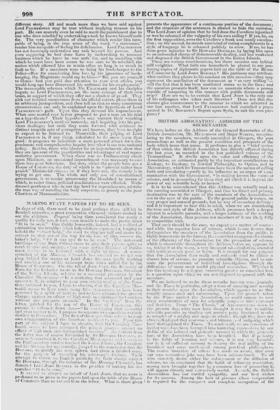REASONS FOR THINKING IT UNNECESSARY TO IMPEACH LORD PALMERSTON.
RESPECTFULLY sun:art:Tun To rem BELIEVERS IN unounster.
Foil Lord Patonmsgost as a Minister we entertain no respect what- ever. Ile is an acute man, endowed with a talent for light easy pleasantry, (see his squibs against the Whigs in the
Guide and elsewhere) affilble and pleasing in intercourse, possessed of command or temper, and familiar with the practical iletadS of office. 11 is natural and at (mired abilities have enabled him to retain office under Cs:ems:it I; II, LIVERPOOL, CANNING, PLEL and WELLINBTON, Gana. and ME LIMMRNE. lie lets rarely committed himself very glaringly ; and having a knack at that sort of argu- mentation which passes muster in the House of Commons, gene-
rally manages to elude attacks. In controversies with foreign diplomatists, he contrives, by avoiding reference to general prin- ciples or Insatd, views of national policy, and by arranging against his opponents a host of uplestions of etiquette, suspicious move- ments, and the like, to put them upon the det'unsive upon minor points, break down the dispute into a skirmish of details, and by protracting the discussion, bring all parties to such a temper, that from sheer weariness they bring it to a close, leaving every thing essential us unsettled as at first.
All this is mere official cleverness, not statesmanship. Lord PALMERSTON is like Obadiah's parish bull : he goes through the dis- charge of his official duties with such a plausible formality, that men cannot be brought to suspect he is after all doing nothing, until the result proves it. Ile is great in concealing the appearances of slovenliness, indolence, and omission in the conduct of business. Ile is dexterous at getting up a fair-spoken narrative of what he has due, and throwing into the shade what ought to have been done, what was proposed to be done, and whq has been left undone. He is like the manager of a joint-stock company who should keep no regular books, spend the year in projecting great undertakings in moments of enthusiasm, and relapse into idleness when the fit was over; but annually delight the ears of the shareholders with a taking and eloquent report on the state of their affitirs. Lord PALMERSTON began his career at a time when tl.e constitution of the Legislature and the relative position of parties made clever plausible talkers and writers in great demand. Ile learned his statmananship as a lawyer's clerk picks up his law. Ile is a master of fence, mud from long practice can use his weapons dexterously and even gracefully ; but he is meal able of raising his mind to conceive them as mere means to an end. From the school of CasTLEREAGH, through that of CANNING, lie has passed into the cosahaee of NA-Ng- gery ; he has listened to the professed political doctrines of each of his masters in succession, and lisped the shibbnleth aner him ; but it has never occurred to hint that political doctrines must have a re- ference to the external as well as to the internal relations of a state; and that the international policy of a Whig Government ought in common honesty and regard for appearance to diffir somewhat from the international policy of a Tory Government. Statesman- ship, in his acceptation of the word, means nothing more than the knack of managing parties and political leaders so as to keep him- self in place, and of discharging the routine duties of office in such a manner as to enable him to get up a good case when attacked by the Opposition.
Lord PALMERSTON is not the only man whom skill in saving ap- pearances has enabled to go on prospereusly for a length of years. But such shams always break up at last. Their most skilful de- vices are at best but a postponing of the evil day ; and the longer their success, the greater the entanglement of business and the crash with which they come down. We are much deceived if Lord PALMERSTON'S career is not nearing its termination : and a pretty mess it promises to leave us in We ask no man to accept this outline sketch of Lord Psssma.- STON at our hands as a likeness, without examination. For evi- dence of the playful grace of his manner, his skill in dialectic fence, and his incapacity to deal with great guiding principles, we refer to his early political squibs, to his speeches in the House of Commons, to his correspondence with Count NEssmstom; relative to the affairs of Persia in 1S3S-39, and to his recent letter to Mr. II. L. BULWER regarding his differences with M. TWERS. Of the shifty, momentary character of his diplomatic management, inca- pable of a "large discourse of reason looking before and after," two facts will serve for a proof. At the time of the death of the late Sultan, Lord PALMERSTON, we are told by M. TIBERS, "a first time in his own name, a second time in the name of his Cabinet, proposed to France to join two fleets, one English the other French ; to direct them towards the coast of Syria ; to address a summons to the two belligerent powers, in order to com- pel them to suspend hostilities; to support the summons by naval means ; then to assemble the two fleets at the cutranee of the Dardanelles, and to force that celebrated passage by main force. if the struggle between the Pasha and the Sultan had brought the Russians to Constantinople:' And on the 15th cf. July Ls:. Lord PALMERSTON concludes a treaty with the Emperor of Bassia, (and the Sovereigns of Austria and Prussia,) in the third article of which it is agreed, that in the event of Mmirsuer Asis directing his forces towards Constantinople, " the high contracting parties, on the requisition made by the Sultan to their representatives at Constantinople, are all agreed in such c.lse to answer the invitation of that sovereign, and to provide for the defcnee of his throne by means of a coi■peration concerted in common for the purpose of putting the two straits of the Darda 11 ne..es. as well as the cagital of the Ottoman empire, secure against all aggression." For the right understanding of this article. it is necessary that we advert to the value of Prussia and Austria as integrent members of the alliance. Russia sways the Cabinet of Berlin ; and besides, the geographical position and efficient disposable force of Prussia, put active inter- ference from that nation out of the question. The rondcrous in- ertness of Austria daring all the struggles bet w cell Russia and Turkey since the time of the Empress C VrItr1117sr. sufficiently shows how much is to be expectcd from that par. The real
eoilneration will be betwet n England and To Lord
PaLstmtsrox it is a matter oft,: rfect inditFcrci a , be allied with France or Russia—whether he be engsgs.1
force the Dardanelles or in an attempt to pre , :r :1•.e In the course of a few months we find him cnTh . es for two diametrically opposite courses of policy. it is
unreasoning acting upon the whim of the mole;e:- this forming and dissolving the alliances of nations with the ,g ea facility with which the eternal friendships of schoolboy .1 y ,1'.7:; ladies are tinarted and dissolved—that ha%e brought Feiees aisi England to tile verge of a war. about a matter in which net- ,ountry has the most remote tangible interest nor the ;:hadow of a pretext for volunteering its impertinent interference. All these considerations term valid reasons for wishing to see Lord PALMERS ION ejected frolll office. hut IMPEACIINIENT is a different story. AU and much more than we have Said against Lord PALMERSTON may be true without implying treason on his part. He can scarcely even be said to merit the punishment due to one who does mischief by undertaking a task he knows himselfunfit for. The very peculiarities of character which render him inca- pable of being, in the true sense of the word, " a statesman," render him incapable of feeling his deficiencies. Lord PALMERSTON has not knowingly undertaken any task beyond his powers. And even supposing he had done harm by undertaking to transact business which he knew he was unfit fur, and by meddling with which he must have been aware he was sure to do mischief, the nation which allowed him to retain office so long is as much in fault as he. If a merchant were to bring his book-keeper to the Police-office for occasioning him loss by his ignorance of book- keeping, the Magistrate would say to iminm—" Sir, you are yourself to blame : had you paid due attention to your own affitirs, you would long ago have discovered his unfitness for his employment." The treasonable schemes which Mr. U1O/UHART mid his disciples impute to Lord PALMERSTON, are the mere coinage of their own brain, in support of which they offer not a shadow of proof. They pick out isolated occurrences from his official carCer, place them in an arbitrary juxtaposition, and then tell us that so many concurrent circumstances can only be explained upon the hypothesis of Lord PALMERSTON'S guilt. Upon this they demand his impeachment. What sane mortal ever before proposed to put a man on his trial on a hypothesis? Their hypothesis may warrant their watching Lord PALMERSTON'S motions narrowly, and inquiring into his pre. vious dealings; but until they come forward with evidence to distinct tangible acts of corruption and treason, they have no right to expect to be listened to. Meanwhile, their yelping at Lord PALMERSTON is, if any thing, calculated to do more harm than good : it proposes to substitute a mere personal attack for a dis- passionate and comprehensive inquiry into what is our true national policy. Besides, those who bluster for an impeachment, show that they are ignorant of the peculiarities and advantages' of real repre- sentative government. When there was no Parliamentary check upon Ministers, an occasional impeachment was necessary to awe them into good behaviour. But now, either the people have got a House of Commons, the duty of which is to " prevent rather than punish" Ministetial crimes ; or if they have not, the remedy is in trying to get one. The whole and only use of constitutional government, is to render unnecessary the bloodshed by means of
which, in ruder times, political ameliorations were effected. Well- dressed gentlemen who in our day bawl for impeachments, mistake the true way of mending the body corporate, as grossly as the poor Chartists of .Montnoutlishire.



























 Previous page
Previous page